The next U.S. president will have to come to terms with “the will of the Iranian people” and end the economic war against the Islamic Republic, Iranian President Hassan Rouhani said in a speech Thursday. Bluster aside, there is a kernel of truth to his prediction — and President Donald Trump’s Iran policy may make negotiations easier for President-elect Joe Biden.
Iran will hold presidential elections next year, and Rouhani is dealing with an economy that has been pummeled by the sanctions that the U.S. imposed after 2018, when it withdrew from the 2015 nuclear agreement. Both Trump and Biden have said they would negotiate with Iran after the 2020 election. In those negotiations, the Biden administration should use Trump’s “maximum pressure” policy to its advantage.
This sounds like a contradiction. When Trump withdrew from the nuclear deal, Biden and most Democrats denounced what they perceived as reckless petulance. Former Secretary of State John Kerry even advised Iran’s foreign minister to wait out the Trump administration until the 2020 elections, in the hopes of salvaging the agreement.
Biden has also pledged that the U.S. will re-enter the nuclear agreement if Iran “returns to strict compliance with the deal,” he wrote in the March/April issue of Foreign Affairs. This means that he would lift many of the nuclear sanctions that Trump has re-imposed if Iran brings its low enriched uranium stockpiles back under the limits in the 2015 deal.
Biden’s position is more moderate than many Democrats who argue that the U.S. should re-enter the nuclear deal unconditionally. Nonetheless, his stated position risks missing an opportunity.
But don’t take my word for it: Biden himself and many of his top advisers have acknowledged that the 2015 agreement must be improved. Limits on low enriched uranium production, for example, which can be further enriched into fuel suitable for a nuclear weapon, begin to expire in 2026. Last month, a U.N. ban on selling advanced conventional weapons expired. In a few years, Iran will be able to begin installing more efficient, advanced centrifuges.
Biden has said that he would pursue fixes to the nuclear deal after the U.S. rejoined the agreement. He has described this as using “our renewed commitment to diplomacy to work with our allies to strengthen and extend” the agreement, and work with those allies to more effectively push back against “Iran’s other destabilizing activities.”
That is a worthy goal. But it makes no sense to think that Iran would be more inclined to make concessions it has not already made after economic sanctions are lifted. Here the Trump administration has done its successor a favor. Not only has Trump imposed nuclear sanctions on Iran’s oil exports and crucial economic sectors such as metals and petrochemicals, but it has also imposed a series of sanctions on Iran for its support of terrorism.
Just last month, the Trump administration sanctioned Iran’s oil ministry, its national oil company and its national tanker company for support for the Islamic Revolutionary Guard Corps and Quds Force. The administration’s 2019 decision to sanction Iran’s central bank was also tied to its financial support for terrorism, not its nuclear program.
So Biden could lift nuclear-related sanctions but still keep terrorism-related ones in place if the Iranians do not agree to make further concessions. Mark Dubowitz, the chief executive of the Foundation for Defense of Democracies, told me that Biden is in a position to ask Iran’s regime to “help me, help you.”
There are a few reasons for this. For one, Republicans could win back the presidency in four years. As Iran has learned, any agreement with the U.S. that is not ratified by the Senate as a treaty can be withdrawn by the next president.
There is also the broader issue of risk and perception of risk for financial markets. If the Iranian regime wants money to invest in its oil sector and economy, large banks and corporations must be assured that they will not face problems down the road. Biden alone cannot make those assurances if Iranian banks continue to engage in terror financing and money laundering. This will require Iran to up take more substantive reforms on its own.
None of this is to say that Biden cannot and will not lift some sanctions in exchange for some Iranian concessions. All of that is likely to happen. The test for the Biden administration will be to use the leverage Trump has created to improve the 2015 nuclear agreement and pressure Iran to end its regional aggression.-Bloomberg
Also read: Trump-to-Biden handoff stalls as President refuses to concede






